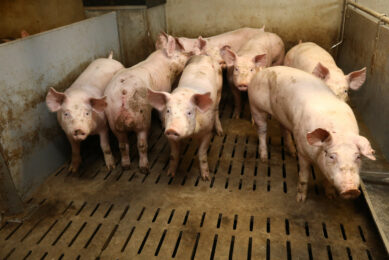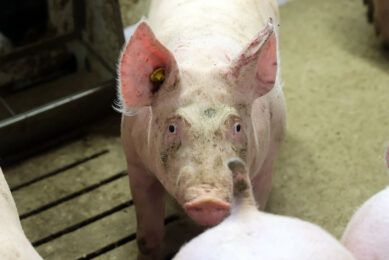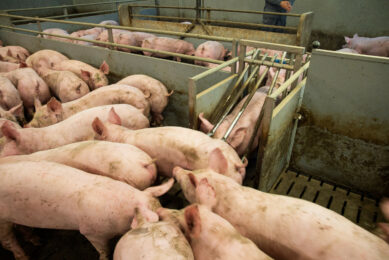Irish farmers reap the benefits of swine influenza vaccination
Vaccinating against swine influenza is making a big difference to the businesses of two pig producers based in County Cork in the Republic of Ireland. Across the two businesses, which vary considerably in size, the use of swine influenza vaccine is credited with helping to reduce returns, and increasing the number of pigs that are being sold on a weekly basis. The two farms are among first in the country to use the vaccine which was licensed at the end of 2010.
Maurice O’Brien works alongside his father Connor on their 2300 sow farrow to finishing unit. Connor started the farm originally as a fattening unit in 1978, and started breeding in the 1990s. Today they produce around a 1000 pigs a week at an average liveweight of around 105 kg.
It is a minimal disease herd, and every precaution is taken to ensure that the high health status of the herd is preserved. This includes a bio-security cordon around the farm buildings; a special area for loading the pigs into the lorry to go for slaughter; and bird proofing.
“We believe that prevention is the best policy,” says Maurice, ”As well as the bio-security measures, we use preventative medicines such as vaccines, to ensure we keep the pigs in the best possible health.”
They first started implementing swine influenza vaccination following an outbreak of coughing among the sows. After discussing the problems with their vets and reading about the benefits of controlling swine influenza, they decided it would be better to take a proactive approach and to implement a vaccination program to control the circulation of swine influenza in their units.
“We would wholeheartedly agree with the reports of other producers using vaccination to prevent problems caused by swine influenza” says Maurice, “We have seen a definite increase in the number of sows that are farrowing successfully. Before, our farrowing rate was around 80 to 85%. Now our rate is consistently above 90%. So we are feeding and keeping a lot less unproductive sows, and with the current price of feed, that’s an important consideration.”
Maurice also points out that using the vaccine has reduced the farms’ reliance on antibiotics. “Right now every farm in the world is trying to reduce their use of antibiotics,” he says, “Vaccination is one way of doing this, and it is the route which we have chosen to go.”
Since introducing the swine influenza vaccination at the end of last year, the O’Briens have established a regime of vaccinating their sows twice a year before farrowing.
Eugene Sheehan’s unit with around 300 sows produces 155 pigs every week. Eugene first found out about the possibility of using swine influenza vaccine in 2007 during a visit to France and Germany.
He says: “I could see that they were getting good results with it. In this country we would get a hit in the autumn and we would always blame the cereals which we were feeding the pigs. I don’t believe it was the cereals at all but actually swine influenza. As a result I have been asking for swine influenza vaccine to be made available in Ireland for some time and I was very pleased when Merial got a license and began selling it in 2010.
“Since we introduced the swine influenza vaccine we are selling around 20 pigs a week more than we were selling two years ago. We have less sick sows, our farrowing rate jumped by four points; we have fewer abortions, more pigs born and less sick pigs on the unit.
“In the autumn – September, October, November – it can be 16 degrees by day and three degrees by night. It is very difficult to regulate the temperature in the pig units, and, prior to introducing the vaccine, the pigs would get sick. You would lose production and get fewer sows farrowing for January, February and March. Once we introduced the flu vaccine, we found that this didn’t happen.”
When he introduced vaccination to his herd Eugene treated the herd twice within two weeks and now vaccinates every six months.
Brian Rice, a veterinary surgeon with Merial Animal Health, says: “Evidence from other European countries including the UK and France, suggests that swine influenza is more widespread than might be thought. In sows swine influenza can affect return to oestrus, cause increased incidence of abortion, increase the number of still born piglets, and decrease lactation. Therefore there is a strong economic case for considering preventative treatment.”











